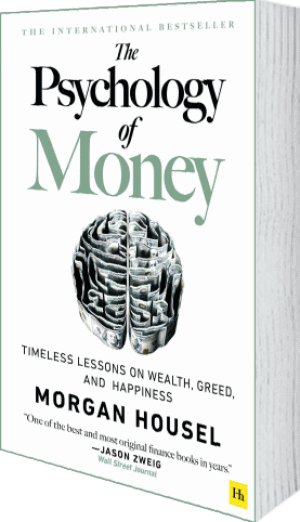Most best-selling books on investing and personal finance are from the west (mostly US). With such publications, readers in India will need to do some sifting through and quite a bit of mental arithmetic before deriving value from the book.

Rarely does a book come along that is readily accessible and relevant to the Indian audience. “The Psychology of Money” by Morgan Housel is one such book. I heartily recommend it.
Morgan distils the enduring wisdom about the relationship between people and their money in 20 chapters. Some of these chapters are about stocks and the market, but most of them are about people – about the games they play with money.
Each of these chapters can, as the author notes, be read individually as well. But they are not disjoint essays. Each essay pushes the narrative farther, and helps the reader to get a fulsome understanding of how the relationship with money works for people – all the misconceptions about money and wealth and all the traps and pitfalls investors land themselves in time and again.
That said, this book is definitely not a litany of “don’ts”. For every single admonition that the author makes, he points to the right way as well.
The concepts themselves are simple and time-tested – the role of luck in investing, why timing the market will not work over long periods of time, importance of patience, the right way to do planning and more.
But Morgan writes about them with a straightforward clarity and with persuasive arguments, and always keeps it interesting. To illustrate the power of compounding, he goes all the way to the geology of ice ages. To show the power and importance of luck, he cites an example from the early life of Bill Gates. And he uses examples from his own youth to tell readers about how people perceive being rich.
The most important point that the author makes is about why one should strive to build wealth – why one should save and invest. If one reads the book and takes that single point to heart, it would have served its purpose.
I would recommend the book especially to young people – the sooner they understand these points, the better the rest of their lives would be.
The book is definitely worth the time and effort (It is neither long – 240 pages, nor expensive Rs 285). However, if you don’t want to spend the time/money to get the book, you can read a synopsis of the book here in Morgan Housel’s website.
(not an affiliate link)




2 thoughts on “Psychology of Money: What we think about when we think about money”
Totally agree !!
I finished the Audible version of this book just last week. (a hack for those who do not even want to spend this Rs 285, Audible is offering 90 day free trial with 3 free audible books of your choice – that’s how I got this free).
In addition to what you said – what I also liked about the book is how politely the author makes his point about every celebrity Financial viz (Fund managers, Authors, PMS guys and Journalists) quoting Warren Buffet, Charlie Munger, John Bogle, Schloss – but nobody follows their methods. In fact how books like The Intelligent Investor – last edited more than 45 years back – is irrelevant now. The author himself updated his formulae every 5-10 years as their relevance kept on changing, while he was still alive. How even Buffet found his own way – quite different from Graham even after considering him his Guru. How a long list of Buffets failures are never discussed. How if in the current times we try to strictly follow these Gurus’ technique, we would never really be able to buy anything. WE have to find OUR own way.
The best book I’ve come across in a very long time – and this is not just a book about Personal Finance – but about life lessons.
One confession to make though – in spite of his warning, I started the audible of ‘The Intelligent Investor’ after this (as a true Indian bargain hunter, I was getting this Rs. 18,000 costing audible for FREE, I thought of trying :D) – half way through – I really don’t know why this book is so much talked about.
Regards
Thanks for the detailed comment – yes, the points he makes about fund managers and the Graham book are very interesting!
Comments are closed.